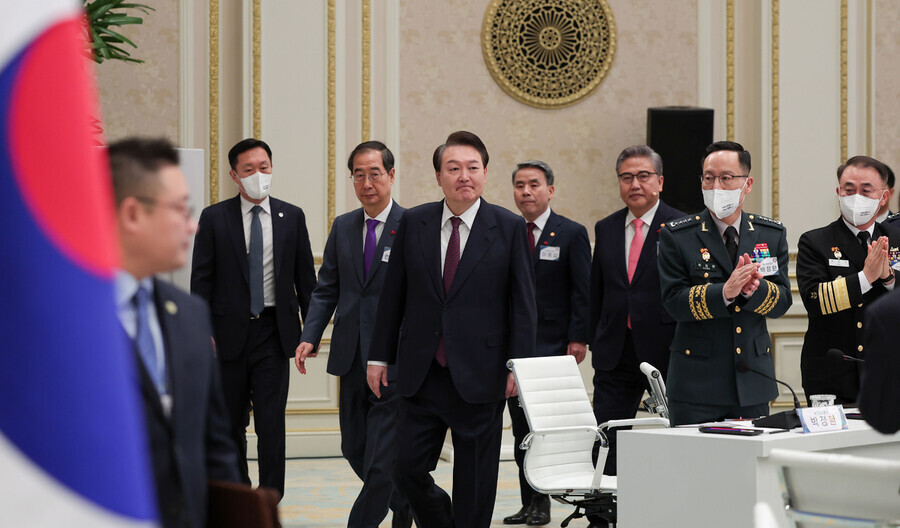hankyoreh
Links to other country sites 다른 나라 사이트 링크
Yoon criticized as “parroting” Japanese PMs after excusing Japan’s militarization

During a briefing by the foreign and defense ministers on Wednesday, President Yoon Suk-yeol made a statement seemingly supportive of the Japanese government's stated intent to boost military spending and acquire counterstrike capabilities to hit enemy bases, saying “nobody would take issue with it.”
Having constantly stressed security cooperation with the United States and Japan since taking office, Yoon seemingly signaled his will to bolster trilateral cooperation still further.
However, critics say he is rationalizing Japan's moves to become a military power far too easily, while overlooking the behavior of a country that remains unrepentant about its aggressive and imperialist past.
In his concluding remarks to the briefing session at the Blue House, Yoon said that “it would be “hard to stop” Japan’s moves “while [North Korean] missiles are flying over their heads and nuclear strikes could come their way.”
“Isn’t that why they decided to boost their defense spending and include the so-called counterstrike concept in their defense plans?” he added.
Citing changes in the international order and the security situation, the Japanese government amended its national security strategy late last year, stipulating “counterstrike capabilities” that would enable Japan to strike missile bases in surrounding countries like North Korea and China during an emergency.
The new strategy also called for a dramatic rise in defense spending and reorganizations to the Japanese Self-Defense Forces.
Tokyo is not amending its pacifist constitution, but since the proposed changes were announced, critics in Japan have warned that the moves would render the country's “exclusively defense-oriented policy” of the last seven decades an empty shell.
There has been considerable concern, too, about how Japan argues that the Japanese Self-Defense Force could launch counterstrikes on North Korea in accordance with “collective self-defense” — should the US wish it — if North Korea attacks a US warship during an emergency.
South Korea's foreign ministry responded by saying Tokyo absolutely requires prior close consultation with and consent from Seoul in matters that have a “grave impact on Korean Peninsula security and our national interests,” but suspicion follows whether the two countries really would hold proper consultations.
Since taking office, Yoon has made improving ties between Seoul and Tokyo a foreign policy goal, sounding out Japan about building a future-oriented cooperative relationship and restoring shuttle diplomacy.
In the first Liberation Day address of his term, Yoon on Aug. 15 called Japan “our partner as we face common threats that challenge the freedom of global citizens,” while in an interview with the New York Times in September, he proposed a “grand bargain” that would put the “comfort woman” and forced labor issues along with other pending issues such as security cooperation and economic and trade issues on the table to improve ties between Korea and Japan.
However, relations have not subsequently improved as quickly as Yoon thought they would.
He encountered controversy over a summit criticized as “humiliating” when the Japanese government called the first summit between Korea and Japan in two years, nine months during the UN General Assembly last September a mere “chat.”
The Korean government is trying to speed up efforts to resolve the colonial-era forced labor issue.
In a telephone call with the Hankyoreh, University of North Korean Studies professor Kim Dong-yup said Yoon’s comments “were something the Japanese prime minister could say, not the South Korean president.”
“No matter how many issues you need to resolve between Korea and Japan, including historical issues, it’s inappropriate to so easily rationalize Japan’s rearmament,” he said.
By Kim Mi-na, staff reporter; Shin Hyeong-cheol, staff reporter
Please direct questions or comments to [english@hani.co.kr]

Editorial・opinion
![[Column] When ‘fairness’ means hate and violence [Column] When ‘fairness’ means hate and violence](https://flexible.img.hani.co.kr/flexible/normal/500/300/imgdb/original/2024/0516/7417158465908824.jpg) [Column] When ‘fairness’ means hate and violence
[Column] When ‘fairness’ means hate and violence![[Editorial] Yoon must stop abusing authority to shield himself from investigation [Editorial] Yoon must stop abusing authority to shield himself from investigation](https://flexible.img.hani.co.kr/flexible/normal/500/300/imgdb/original/2024/0516/4417158464854198.jpg) [Editorial] Yoon must stop abusing authority to shield himself from investigation
[Editorial] Yoon must stop abusing authority to shield himself from investigation- [Column] US troop withdrawal from Korea could be the Acheson Line all over
- [Column] How to win back readers who’ve turned to YouTube for news
- [Column] Welcome to the president’s pity party
- [Editorial] Korea must respond firmly to Japan’s attempt to usurp Line
- [Editorial] Transfers of prosecutors investigating Korea’s first lady send chilling message
- [Column] Will Seoul’s ties with Moscow really recover on their own?
- [Column] Samsung’s ‘lost decade’ and Lee Jae-yong’s mismatched chopsticks
- [Correspondent’s column] The real reason the US is worried about Chinese ‘overcapacity’
Most viewed articles
- 1China calls US tariffs ‘madness,’ warns of full-on trade conflict
- 2[Column] US troop withdrawal from Korea could be the Acheson Line all over
- 3[Editorial] Yoon must stop abusing authority to shield himself from investigation
- 4[Column] When ‘fairness’ means hate and violence
- 5[Column] How to win back readers who’ve turned to YouTube for news
- 6US has always pulled troops from Korea unilaterally — is Yoon prepared for it to happen again?
- 7[Book review] Who said Asians can’t make some good trouble?
- 8Naver’s union calls for action from government over possible Japanese buyout of Line
- 9Could Korea’s Naver lose control of Line to Japan?
- 10[Editorial] Korea must respond firmly to Japan’s attempt to usurp Line